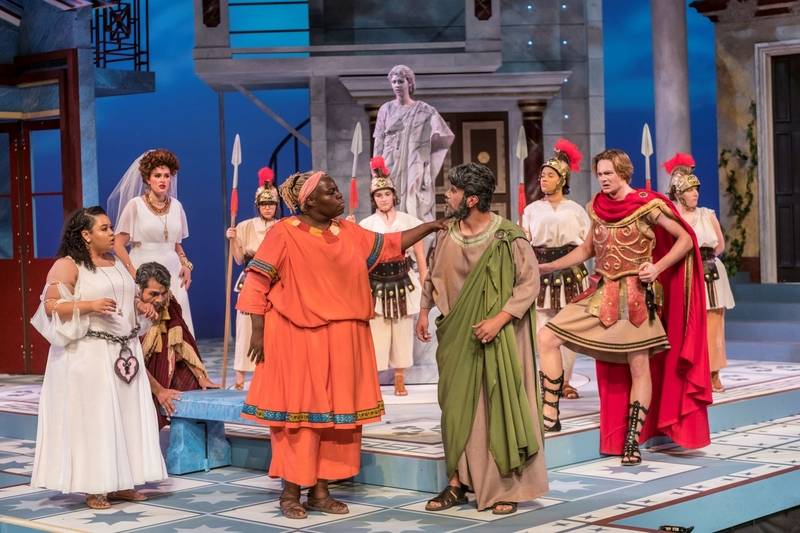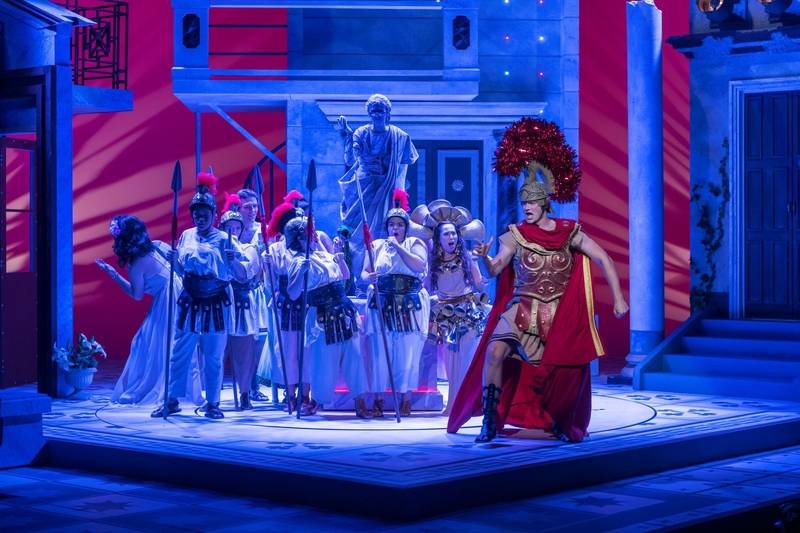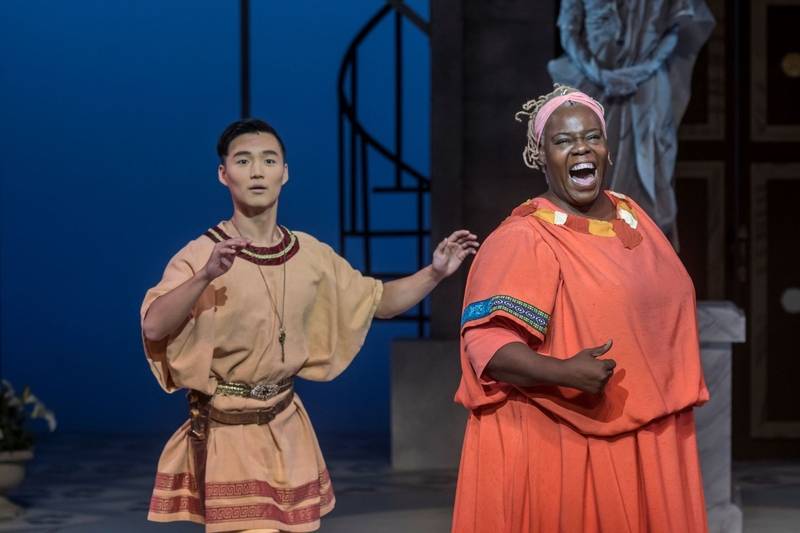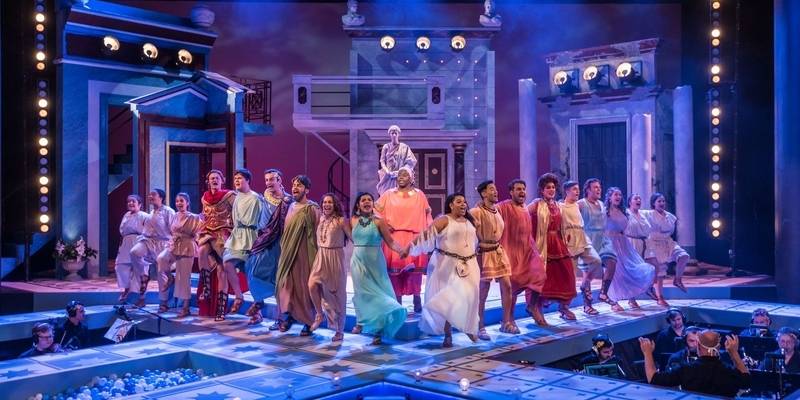This Thursday marks the opening of Illinois Theater’s production of the 1962 comedy A Funny Thing Happened on the Way to the Forum. A Tony Award-winning tale of life and love and an homage to the many ways that comedy heals and unites, Illinois Theater’s adaptation of this classic piece of musical theater, directed by J.W. Morrissette, promises an immersive entertainment experience as well as an examination into the many different ways we use humor in our daily lives. There will be singing, slapstick and lots of laughter.
I had the opportunity to pick Mr. Morrissette’s brain in the busy lead up to opening night.
Smile Politely: Can you please provide our readers with a little background on your theater experience and connection to the university?
J.W. Morrissette: I currently serve as the Associate Head of the Department of Theatre where I have been (in some capacity) for the past 23 years. I hold an MFA in Acting and an MA in Theatre History. I’ve directed for the past 21 years at the Interlochen Center for the Arts and throughout the local community.
SP: In a couple of sentences, can you describe the play?
Morrissette: This piece is a celebration of the vaudevillian stage, based on the works of Ancient Roman playwright Titus Maccius Plautus, and told through the wonders of the American musical theatre stage. In short- Pseudolus, a Roman slave, wants to gain his freedom and in attempting to do a world of musical hilarity ensues.
SP: Is there any special reason why you’ve chosen to direct this play? Does it have any special meaning for you?
Morrissette: The original decision to include this piece in the season was inspired by the need to teach our students professional practice skills and, in this case, focus on comedy and musical theatre. The other reason it was chosen was to continue to offer the challenge of looking at theatre as a form of research — we were curious to see how comedy has changed throughout history and particularly curious to see what a contemporary production of this 1962 musical (based on the works of an Ancient Roman playwright) might offer to our mission as a department.

SP: The original play won several Tony Awards and was successfully adapted for film. Many people have had their own “take” on this show. How have you adapted the original source material to make the the play your own?
Morrissette: Like every production we are a snapshot of the resources available to us at this time in this place. That means our cast, our designers, our stage management team, our musicians, and all parts of our creative team bring their considerable talents to bear in this show. They are all products of our times and as such they bring a 21st century sensibility to their work. Perhaps the most visible of choices comes from our casting choices. We have allowed the actors to bring themselves to their work and that has reflected a far more inclusive theatre than the 1962 production saw (or the movie.)
SP: In the show’s billing on the Krannert Center website, the following line appears: Illinois Theatre will adopt a uniquely 21st-century lens in exploring how comedy has changed through the centuries. Can you unpack this notion a little bit? In your opinion, how has comedy changed? How is it the same? How does this show illustrate these dynamics?
Morrissette: One of the issues we’ve bumped up against in exploring this work is that in the 21st century almost anything you create has the potential to be offensive to someone somewhere. When I was younger the general theory of comedy was that offense was acceptable as long as it was a form of equal opportunity offense — everyone is made fun of therefore everyone is included. I don’t think that is the current trend in comedy. Now, there are simply things like certain language and certain representations that simply aren’t acceptable fodder for comedy. I’m not a censor and I don’t desire to be any individual’s judge of what they find funny but I have seen audiences change in their opinions of what they are willing to experience. Hamilton creator,, Lin Manual Miranda, said his goal was to tell the story of “America then, told by America now.” I’ve always thought we were doing just that with A Funny Thing Happened on the Way to the Forum. We are telling the story but with a much more inclusive and contemporary cast.

SP: The play deals with a wide variety of different dramatic themes (like fate, love, class divisions, duplicity, etc.). How is comedy used to explore these “heavier” themes? Do you feel like a comedic perspective on such topics affords the audience any unique insight? If so, how/why?
Morrissette: Adapting a quote often attributed to more people than is historically possible I can offer this: Comedy equals Tragedy plus Time. Given enough time to reflect on the human condition comedy may come as a coping mechanism or even a logical step in the process of exploring the human condition. That sounds terribly non-specific and pretentious so let me add this. In the right situation and with the right mix of respect and concern comedy can often give us access to topics we would not explore because of their “seriousness” or their “reverence”. It can be a risk to explore where those boundaries exist but comedy requires risk. I also think, where appropriate, comedy gives us the chance to take ourselves a bit less seriously so all the oxygen in a space isn’t consumed by offense but rather some is spared for the failings that make us human.

SP: This play is a lyrical comedy that features more than a little physical, vaudevillian humor. How did these considerations influence your casting decisions? Were you looking for anything in particular from the actors who auditioned?
Morrissette: We are a professional training program and as such we want to set challenges for our students. Learning how to sing, dance, and be funny are all basic building blocks of our profession so we wanted a cast that shows an aptitude for exploring those facets of production. Essentially we wanted artists who weren’t afraid of big, bold choices and were willing to delight an audience through their work. This is one of the reasons I approached Professor Dixon about playing Pseudolus.Her work is outstanding — anyone having seen her perform will know what I mean but as a model for our students to emulate — we couldn’t ask for a more hands-on learning environment.
SP: Similarly, can you provide any insight into how you and your set design team plan to transform the Colwell Playhouse into the streets and homes of ancient Rome?
Morrisette: Our team of designers has been on each and every step of our journey exploring the very ideas I’ve discussed above. They brought their own perspectives to their talents and their interpretations of the comedy of this work into the theatre. Without spoiling too much, they are not only going to transform the Playhouse, they are going to redefine what anyone thought possible in that space. That’s how amazing their work is. Without a doubt you will see some things that have never been done in the Playhouse before.
SP: Final Question: why should people come see this show?
Morrissette: If someone wants to enjoy themselves to the point of hysterical laughing then they should come on by! If someone wants to watch outstanding performances they should come on by! If someone wants to see that professional theatre is alive and well in central Illinois they should come on by! By the end of the evening they should expect to find themselves happier and more exhausted by laughter than they thought possible.
A Funny Thing Happened on the Way to the Forum is directed by J.W. Morrissette with musical direction by Michael Tilley and Justin M. Brauer.
A Funny Thing Happened on the Way to the Forum
Colwell Playhouse, Krannert Center for the Performing Arts
500 S. Goodwin
Urbana
October 18-20, 7:30 p.m. (Waiting list for October 18th and 19th)
October 25-27, 7:30 p.m.
October 28th, 3 p.m.
Tickets are available at the KCPA website.
Photos provided by Krannert Center








